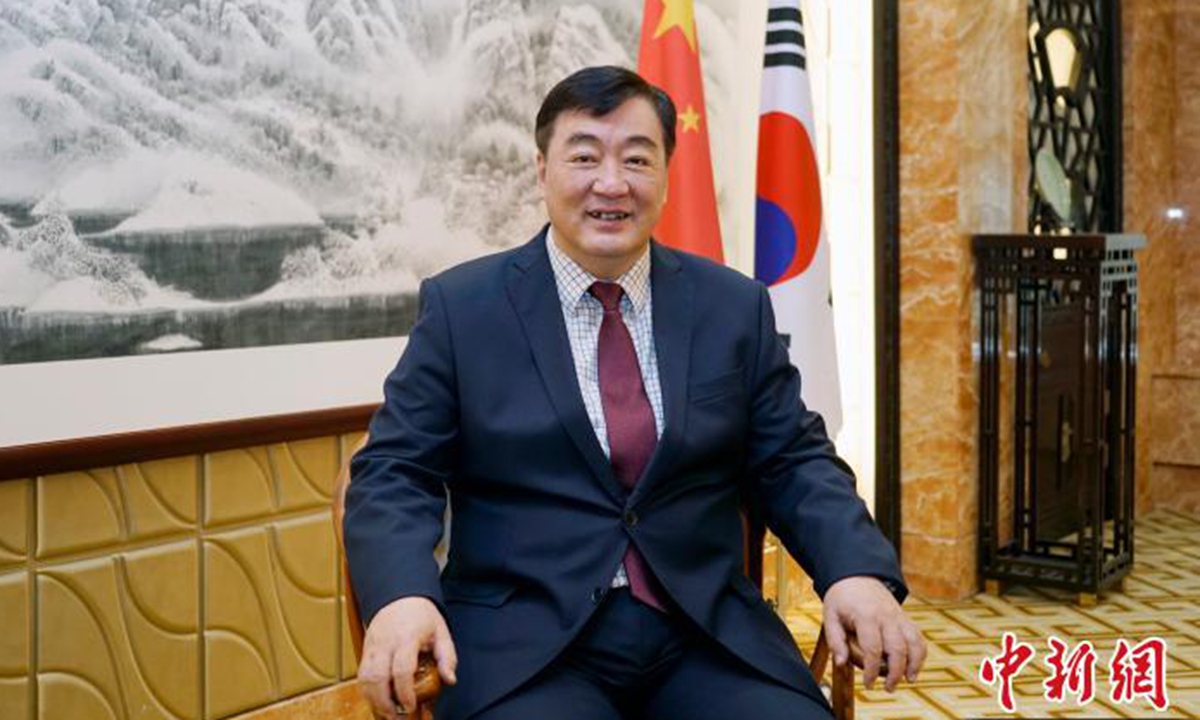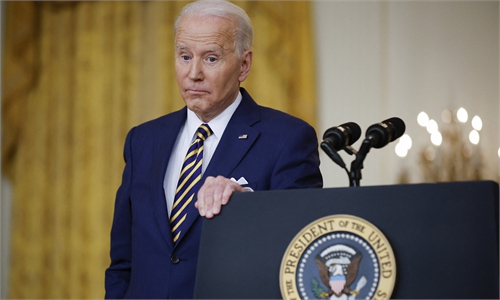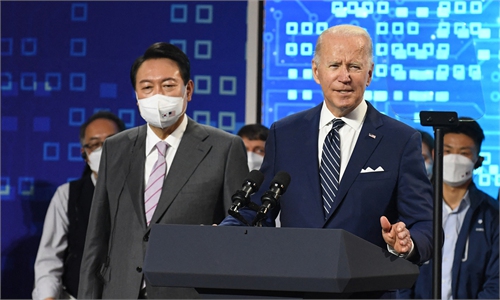China, South Korea to embrace larger devt; hope Seoul ‘does what it says’: ambassador

Chinese Ambassador to South Korea Xing Haiming. Photo:Chinanew.com
Amid concerns over potential foreign policy change following a switch in South Korea's leadership, Chinese Ambassador to South Korea said he believes the South Korean side will meet China half way and jointly promote bilateral relations to a new stage.
Experts also noted that South Korea is unlikely to sacrifice cooperation with China despite participation in the US-initiated Indo-Pacific Economic Framework that aims to exclude China from the global supply chain.
Chinese Ambassador to South Korea Xing Haiming made the remarks at a salon themed on China-South Korean cooperation on Thursday in Seoul, following US President Joe Biden's Asia tour. Representatives from key South Korean multinational companies like Samsung, SK Holdings and Hyundai also attended the forum.
This year marks the 30th anniversary of the establishment of China-South Korean ties, which made huge developments in the past 30 years, Xing said.
He noted that as economic and trade cooperation is the ballast stone and energy source for bilateral ties, China hopes to maintain a mutual production chain together with South Korea, make good use of various platforms, and share the opportunities in the large market of China.
As to the question of whether China is overreacting to South Korea's participation in the IPEF, Xing said South Korea and China are the beneficiaries of free trade and multilateralism. But with the banner of values, the US suddenly started a new regional economic framework that excluded China. "Its real intention is clear."
South Korea stressed that it will join the IPEF based on principles of openness, transparency and inclusiveness, and we hopes it could do what it says, Xing noted.
Biden's visit and recent actions also raised increasing concerns within South Korea that the country may align with the US and abandon its previous balancing strategy. The voice of calling the country to use Biden's visit as an opportunity to improve its own diplomatic independence has become louder.
When asked about the risk of provoking China by forging closer ties with the US in a recent interview with CNN, South Korean President Yoon Suk-yeol noted that "Even if we strengthen our alliance with the US in security and technology, it does not mean that we think our economic cooperation with China is unimportant."
Da Zhigang, director of the Institute of Northeast Asian Studies at Heilongjiang Provincial Academy of Social Sciences, told the Global Times that closer ties with the US does not mean that South Korea will stop seeking a balance between China and the US. It is even more impossible that South Korea would sacrifice cooperation and diplomatic ties with China.
Da said the Russia-Ukraine conflict has changed some people's mentality in South Korea and made them weigh security over economic benefits. "This also reminded China to take more effective measures to not only maintain smooth exchanges with the South Korean government, but also improve people-to-people exchanges while keeping good bilateral trade."
Despite pro-US remarks during his election campaign, Yoon has to make some modifications to avoid spoiling China-South Korea relations after coming to power on the consideration of some realistic factors, such as sharing common interests with China on the Korean Peninsula's peace and stability, as well as the very close economic and trade ties with China, Yang Danzhi, an expert on Asia-Pacific from the Chinese Academy of Social Sciences, told the Global Times.
An official from the Yoon administration reiterated to media earlier this month that the framework does not target China and South Korea is continuing to communicate with China over free trade cooperation. The official noted that South Korea would also discuss with China the service business, investment and market openness under the IPEF.
China and South Korea should find more common interests and strategic cooperation points rather than falling into confrontations under the current circumstance, Yang noted.
There are nearly 70,000 South Korean companies in China, media reported. Xing also stressed on Thursday that China had taken many preferential policies for South Korean companies in China.
South Korean firms around COVID-hit Shanghai had also gradually resumed production. As the epidemic is easing in Chinese cities, Xing said he believes South Korean companies in China would thrive and the two countries' cooperation would witness explosive growth.


